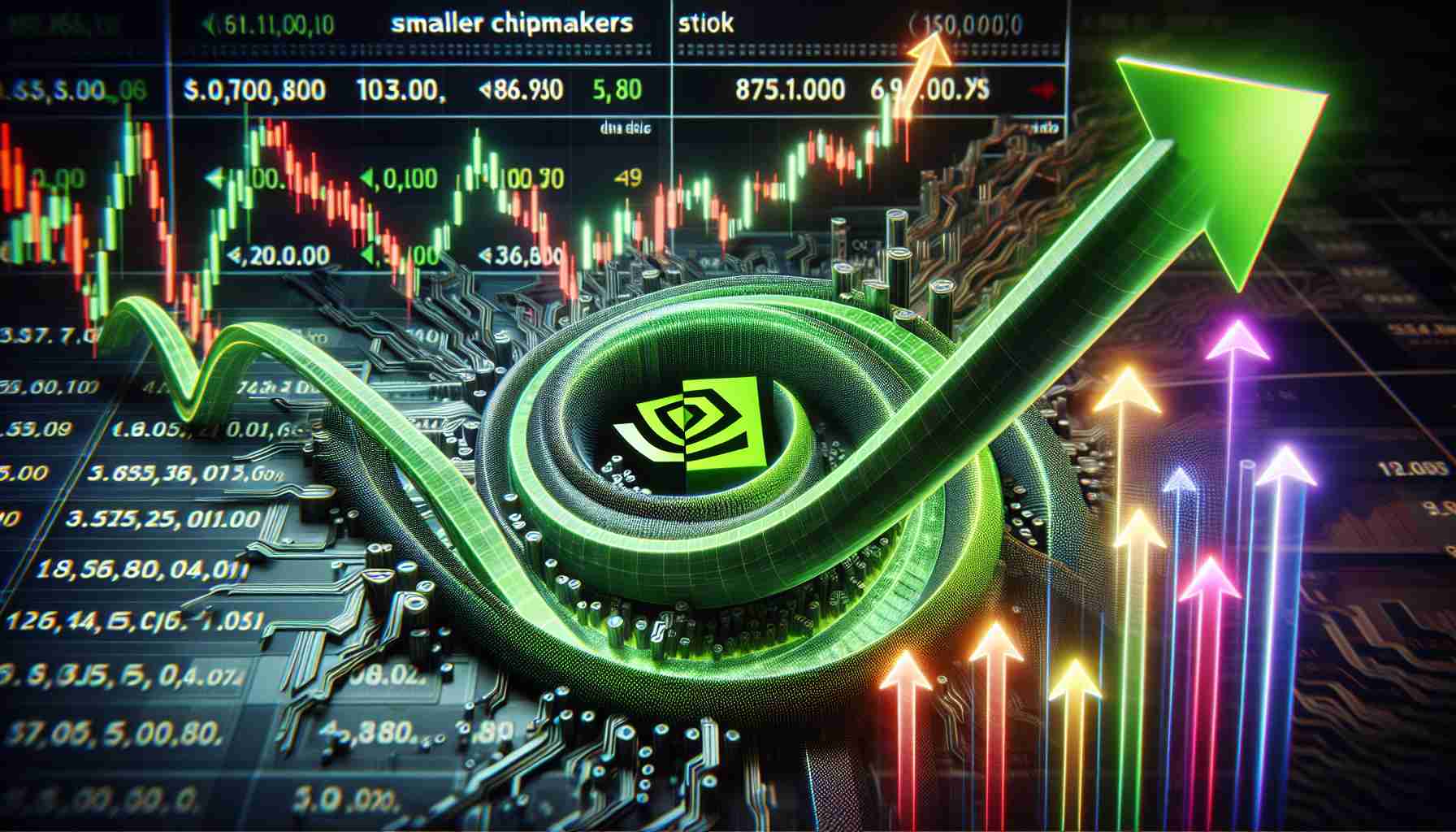New Opportunities in the AI Chip Market
Nvidia has emerged as a frontrunner in the artificial intelligence (AI) boom, with its stock soaring nearly 800% in the past two years. However, the recent quarter has been less favorable for the tech giant, with its shares dipping 1% despite reporting strong earnings that surpassed Wall Street forecasts. This decline raises questions about Nvidia’s ability to maintain its growth trajectory, especially as it confronts valuation issues and increasing costs from the launch of its latest Blackwell processors.
Conversely, lesser-known companies like Ambarella and Lumentum Holdings have seen remarkable growth in the same period. Ambarella’s stock surged by 25%, while Lumentum experienced a nearly 23% increase. Both companies are capitalizing on the rising demand for AI technology.
Ambarella specializes in computer vision chips, critical for automotive and IoT applications. A significant uptick in demand for its CV5 processor, designed to handle AI workloads, has propelled its revenue upward by an impressive 63% year-on-year for the last quarter. The company projects continued strong sales, potentially driving its revenue to $279 million this fiscal year.
On the other hand, Lumentum Holdings has benefited from an increased need for high-speed data transmission in AI servers. After facing challenges in the previous year, Lumentum’s revenue rebounded, with a 23% increase in cloud and networking sales helping to offset earlier losses. As demand for its lasers rises, the company’s outlook appears robust.
Both Ambarella and Lumentum are poised to thrive in the expanding AI market, while Nvidia navigates its recent challenges.
Exploring the Broader Implications of AI Chip Demand
The rapid expansion of the AI chip market signals profound implications for society, culture, and the global economy. As companies like Nvidia, Ambarella, and Lumentum shape the future of technology, understanding their broader impact becomes increasingly vital.
The societal transformation driven by AI technology is significant. As AI becomes integrated into everyday life—from autonomous vehicles to smart home devices—the reliance on specialized chips will undoubtedly grow. This technological dependency may catalyze shifts in workforce dynamics, necessitating upskilling and retraining for employees in various industries. Furthermore, ethical considerations surrounding AI applications heighten the urgency for governance and accountability.
Culturally, the rise of AI chips reinforces the importance of innovation in maintaining a competitive global standing. Nations investing in AI technology are likely to experience shifts in cultural production, prioritizing tech-driven art forms and interactive media, which can redefine entertainment and communication.
On a macroeconomic scale, the global economy stands to benefit from the flourishing AI sector. Estimates indicate that the AI chip market could grow from $16.7 billion in 2022 to over $200 billion by 2030. With countries striving for technological leadership, this growth could spark competition, leading to accelerated advancements across numerous fields.
Finally, the environmental impacts of increased chip production must not be overlooked. Manufacturing processes can contribute to electronic waste and energy consumption, urging manufacturers to adopt sustainable practices. The future is not only defined by technological marvels but also by our collective responsibility to ensure these advancements do not come at the cost of our planet. As the AI chip market continues to evolve, it will shape both the trajectory of human life and the ecological landscape of our world.
Exploring the Future of AI Chips: Growth Beyond the Giants
New Opportunities in the AI Chip Market
The artificial intelligence (AI) chip market is experiencing a dynamic shift, presenting lucrative opportunities for both established giants and emerging players. Nvidia, renowned as a leader in this space, has witnessed an astounding 800% increase in its stock value over the past two years. However, the company’s recent quarterly results have highlighted some challenges, as shares dipped by 1% even after exceeding Wall Street earnings expectations. This raises pertinent questions about the sustainability of Nvidia’s growth amidst valuation pressures and rising costs associated with its latest Blackwell processor launch.
Emerging Competitors: Ambarella and Lumentum Holdings
While Nvidia navigates its challenges, lesser-known competitors such as Ambarella and Lumentum Holdings are making significant strides. Ambarella, focusing on computer vision chips essential for automotive and IoT applications, has seen its stock surge by 25%. The company’s CV5 processor, adept at handling AI workloads, has driven a remarkable year-over-year revenue increase of 63% in the last quarter. With ambitious projections, Ambarella anticipates revenues to reach $279 million in the current fiscal year, suggesting a robust growth trajectory.
Similarly, Lumentum Holdings has leveraged the growing demand for high-speed data transmission in AI servers, resulting in nearly a 23% revenue boost in cloud and networking sales. After a tumultuous previous year, Lumentum is witnessing a revitalization, with increased demand for its laser technologies positioning the company favorably in the AI landscape.
Key Features of Emerging AI Chips
1. High Efficiency: New chips are designed for energy efficiency, crucial in large-scale data centers.
2. Enhanced Processing Power: Advanced architectures that allow for faster processing of AI workloads.
3. Integration with IoT: Compatibility with IoT devices, facilitating smarter applications across industries.
Use Cases
– Automotive Industry: Computer vision chips are pivotal in developing self-driving technology.
– Healthcare: AI chips are enhancing diagnostics and imaging processes.
– Manufacturing: Chips are employed in automation, improving efficiency and reducing costs.
Pros and Cons of Investing in AI Chip Stocks
Pros:
– High Growth Potential: Rapid advancement in AI technology promises continued demand for AI chips.
– Diversification: A wider array of companies capitalizing on AI creates opportunities beyond major players like Nvidia.
Cons:
– Market Volatility: The tech sector can be unpredictable, with emerging companies facing potential risks.
– Competition: Increasing competition can pressure profit margins and market share.
Market Insights and Trends
With the growing push towards AI technologies, the market for AI chips is expected to expand exponentially. Research indicates that the AI hardware market, including chips, is projected to surpass $100 billion by the end of this decade, driven by trends in AI integration across various sectors.
Innovations on the Horizon
Recent innovations in AI chip designs include neuromorphic computing, which mimics the human brain’s neural structure, offering significant enhancements in processing efficiency and speed. Companies are also exploring quantum computing integrations, peering into a future where AI can process data at unprecedented rates.
Security Aspects
As AI technology permeates sensitive industries, security becomes a paramount concern. AI chip manufacturers are increasingly focused on embedding security measures directly into chips to protect against data breaches and other cyber threats.
Predictions for the Future
The AI chip market is on the brink of profound transformation. As the technology matures, companies that adapt quickly to market demands and technological advancements will emerge as leaders. Demand for AI chips will likely continue to rise, not only from tech companies but also across sectors such as healthcare, automotive, and finance, underscoring the need for a diversified approach to investment in this space.
For more insights into the evolving AI landscape, visit Tech News World.


















